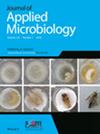New commercial wipes inhibit the dispersion and adhesion of S. aureus and P. aeruginosa biofilms.
IF 3.2
3区 生物学
Q2 BIOTECHNOLOGY & APPLIED MICROBIOLOGY
引用次数: 0
Abstract
AIM Bacterial biofilms can form on the surfaces in hospital, clinics, farms and food processing plants, representing a possible source of infections and cross-contamination. This study investigates the effectiveness of new commercial wipes against Staphylococcus aureus and Pseudomonas aeruginosa biofilms (early attachment and formed biofilms), assessing LH SALVIETTE wipes (Lombarda H S.r.l) potential for controlling biofilm formation. METHODS AND RESULTS The wipes efficacy was studied against the early attachment phase and formed biofilm of S. aureus ATCC 6538 and P. aeruginosa ATCC 15442 on a polyvinyl chloride (PVC) surface, following a modified standard test EN 16615:2015, measuring Log10 reduction and cell viability using Live/dead staining. It was also evaluated the wipes anti-adhesive activity over time (3 h, 24 h), calculating CFU.mL-1 reduction. Data were analyzed using t-Student test. The wipes significantly reduced both early phase and formed S. aureus biofilm, preventing dispersion on PVC surfaces. Live/dead imaging showed bacterial cluster disaggregation and killing action. The bacterial adhesive capability decreased after short-time treatment (3 h) with the wipes compared to 24 h. CONCLUSIONS Results demonstrated decreased bacterial count on PVC surface both for early attachment phase and formed biofilms, also preventing the bacterial biofilm dispersion.新型商用湿巾可抑制金黄色葡萄球菌和绿脓杆菌生物膜的分散和粘附。
目的 细菌生物膜可在医院、诊所、农场和食品加工厂的表面形成,可能成为感染和交叉污染的来源。本研究调查了新型商用湿巾对金黄色葡萄球菌和铜绿假单胞菌生物膜(早期附着和已形成的生物膜)的功效,评估了 LH SALVIETTE 湿巾(Lombarda H S.r.l)控制生物膜形成的潜力。方法和结果研究了湿巾对聚氯乙烯(PVC)表面金黄色葡萄球菌 ATCC 6538 和铜绿假单胞菌 ATCC 15442 早期附着阶段和已形成的生物膜的功效,采用 EN 16615:2015 改良标准测试,使用活/死染色法测量 Log10 降低率和细胞存活率。此外,还评估了湿巾在不同时间段(3 小时、24 小时)的防粘活性,计算了 CFU.mL-1 的减少量。数据采用 t-Student 检验进行分析。抹布能明显减少金黄色葡萄球菌早期生物膜和已形成的生物膜,防止其在 PVC 表面分散。活/死成像显示了细菌集群的分解和杀灭作用。结果表明,PVC 表面早期附着阶段和已形成的生物膜上的细菌数量都有所减少,同时还防止了细菌生物膜的分散。
本文章由计算机程序翻译,如有差异,请以英文原文为准。
求助全文
约1分钟内获得全文
求助全文
来源期刊

Journal of Applied Microbiology
生物-生物工程与应用微生物
CiteScore
7.30
自引率
2.50%
发文量
427
审稿时长
2.7 months
期刊介绍:
Journal of & Letters in Applied Microbiology are two of the flagship research journals of the Society for Applied Microbiology (SfAM). For more than 75 years they have been publishing top quality research and reviews in the broad field of applied microbiology. The journals are provided to all SfAM members as well as having a global online readership totalling more than 500,000 downloads per year in more than 200 countries. Submitting authors can expect fast decision and publication times, averaging 33 days to first decision and 34 days from acceptance to online publication. There are no page charges.
 求助内容:
求助内容: 应助结果提醒方式:
应助结果提醒方式:


